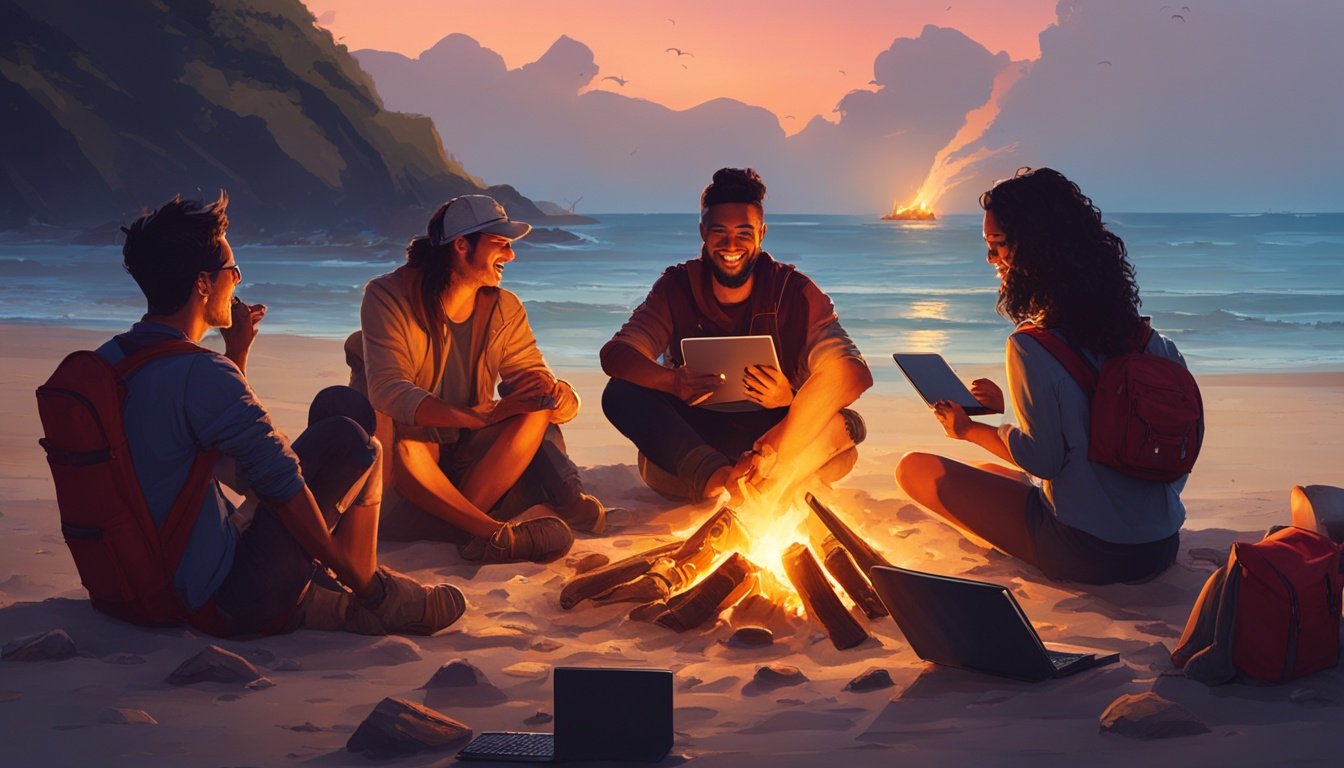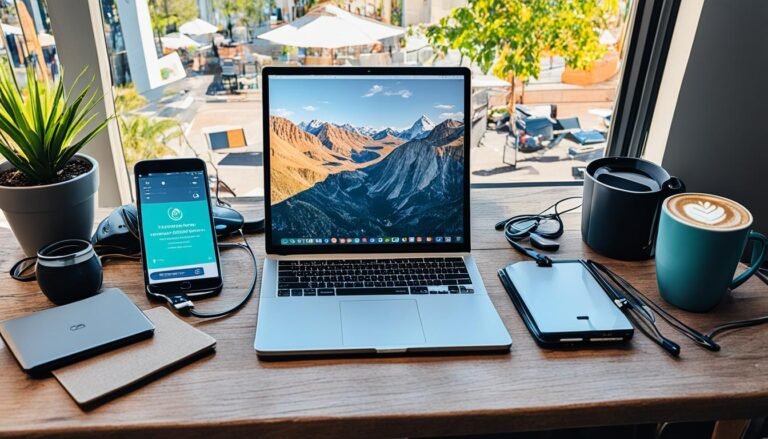Finding Community: Building Social Connections as a Digital Nomad
We all need to feel like we belong, which is key to our well-being. Maslow’s hierarchy of needs shows that being part of a community is essential. But today, even with all the tech, many feel more alone than ever.
Celena Liu, a digital nomad and product designer, says feeling disconnected is often due to lacking real friends. Digital nomads move a lot, making it hard to find a steady community. Yet, Liu has made lasting friends and found her tribe in different places around the world. For her, feeling at home is about the people, not where she lives.
Key Takeaways
- A sense of belonging and community is a fundamental human need.
- Modern technology, while connecting us, often exacerbates feelings of loneliness.
- Digital nomads face unique challenges in building and maintaining social connections.
- Living in coliving communities can provide immediate social integration and support.
- Remote work and travel programs offer structured opportunities to connect with like-minded individuals.
- Maintaining relationships across distances requires prioritization and effective use of communication tools.
Importance of Community for Digital Nomads
For digital nomads, community is key. It’s vital to have support in a world that’s always changing. The digital nomad community offers connections, support, and ways to work together. These are key for staying emotionally healthy and fighting loneliness.
Emotional Health and Well-being
Being part of a community boosts the emotional health of digital nomads. The World Happiness Report shows that social ties are crucial for happiness. Joining a community gives digital nomads a safety net, helping them feel secure while they travel.
Networking in these groups also leads to new business chances. Digital nomads often work with others in fields like graphic design, writing, and coding. This builds a sense of belonging and helps them grow professionally.
Combating Loneliness and Isolation
Loneliness and feeling isolated are big issues for digital nomads because they move a lot. But, being in a digital nomad community helps fight these feelings by offering steady social support. Events and meetups within the community encourage working together, sharing knowledge, and making friends.
Also, coworking spaces offer a place to work and network. Online groups and forums let digital nomads connect, work together, and share ideas no matter where they are.
A strong community is all about being inclusive and diverse. This is key for creativity and new ideas. Through networking, digital nomads can do well emotionally and professionally. They stay grounded by the strong relationships they make in their community.
Challenges in Building Social Connections Abroad
For digital nomads, building social connections abroad is tough. They move a lot, which makes it hard to stay in one place long. This fear of loneliness and the challenge of making lasting friends can be overwhelming.
Frequent Relocation
Always moving around is a big challenge. Digital nomads struggle to make deep connections because they don’t stay in one place long. They enjoy the freedom to move, but it means saying goodbye often. This can make forming relationships feel like a lot of work.
Surface vs. Deep Connections
Because of all the moving, social chats often don’t go deep. Making real connections takes time, trust, and shared experiences. But these things are hard to get when you’re always meeting new people and saying goodbye.
Loneliness among digital nomads isn’t just from not having friends. It’s from not having meaningful ones. Being real and open is key to finding true friends who stick around.
“Building meaningful relationships is not solely based on the time spent together but on the depth of understanding and authenticity shared.”
Groups like the Digital Nomads in Israel Facebook community help people connect online. But these connections are often not as deep as those in person. Joining groups like Nomad Cruise and Remote Year can help. These groups offer a chance to connect with others for longer periods, making it easier to build deeper friendships.
Benefits of Joining Coliving Communities
For digital nomads, coliving communities offer many perks. They are perfect for remote workers, offering quick social connections and fun activities. These spaces help newcomers feel at home and build relationships.
Coliving spots are in great places, offering amazing experiences. For example, Palma Coliving in Spain is a great place. It brings together people from different backgrounds, helping them grow and work together.
Immediate Social Integration
Coliving communities make it easy to meet new people. Right when you arrive, you’re surrounded by others like you. This helps fight off loneliness and makes adjusting to a new place easier.
Access to Social Events and Activities
These communities host many social events and activities. From group meals to cultural tours, there’s always something to do. This helps everyone get to know each other and live together well.
Examples of Coliving Spaces
Selina and Outsite are great examples of coliving spaces. They have shared areas for work and living, fast internet, and modern comforts. They focus on helping people work and relax well.
The Beet Community in Palermo and Cummari House in Catania show the variety in coliving. They have private rooms and shared spaces that are clean and quiet. People share tips and join in on group activities, making their stay better.
Choosing the right coliving community matters. Think about what you want, like being close to certain places or having certain amenities. The right place can really help your mental health by giving you more social support.
Participating in Remote Work and Travel Programs
Digital nomads often look for remote work programs that combine work and travel. Programs like Remote Year provide set itineraries, places to stay, coworking spots, and cultural experiences.
All-encompassing Packages
All-inclusive travel experiences are popular for their ease and sense of community. Remote Year, for example, includes travel plans, living spaces, and places to work. This makes it easy to work and explore at the same time.
Examples of Popular Programs
There are many popular remote work programs out there, each with its own focus:
- Remote Year: A top choice, it offers month-long stays in cities around the world. It’s all about networking and growing your career. Over 3,599,413 times, people have checked out guidebooks and resources on similar opportunities.
- Unsettled: This program mixes retreats with social projects and cultural experiences. It makes remote work a fulfilling journey.
- Nomadbase: With co-living retreats all over the globe, Nomadbase helps digital nomads find a community anywhere they go.
These programs are not just convenient. They also help people meet others who share similar goals. This makes both personal and professional growth more rewarding.
Strategies for Networking as a Digital Nomad
Learning how to network as a digital nomad can really help your career. It opens doors for collaborations, business ventures, and personal growth. With more people working remotely, using social media and going to local meetups is key to building strong professional connections.
Using Social Media and Online Platforms
Sites like LinkedIn, Twitter, and Instagram are great for staying in touch and learning about industry trends. For digital nomads, joining Facebook groups, Slack channels, and forums about remote work can boost their online connections. A 2022 Wall Street Journal report showed how important Slack is for finding jobs.
Being active on social media and writing for industry blogs can show off your skills and draw in professionals who think like you.
“Digital nomads who network have a higher chance of being exposed to new job opportunities and gaining insights into their industry.”
Tools like Lunchclub, which uses AI for networking, help remote workers meet people in their field. Using digital business cards and virtual backgrounds in online chats can also make a strong impression on others, helping to build deeper connections.
Attending Local Meetups and Events
Going to local meetups and events is key for making and keeping professional connections. Apps like Meetup have events just for digital nomads, letting them meet tech pros and other remote workers. These events offer chances for in-person talks and working together.
Coworking spots in places like Chiang Mai, Bali, and Berlin are popular with digital nomads. They host events that help you meet people from different fields. Getting involved in local business events, going to fairs, and volunteering are great ways to meet others, learn new things, and stay mentally well. These local connections offer support and unique business chances, making your travels more rewarding.
Being proactive and open to networking can lead to great connections and growth in the digital nomad world. A 2020 study found 61% of remote workers felt lonely. So, making real connections through online groups and local events is crucial.
Creating and Maintaining Relationships with Locals
Building strong bonds with locals can make your travels much better. It’s not just about being there; it’s about really connecting. This means understanding their culture and having real talks.
Understanding Local Cultures and Norms
To connect deeply with locals, dive into their culture. This shows respect and opens doors for deeper friendships. For instance, in places like Bali or Chiang Mai, joining local festivals and learning about etiquette helps a lot. Cultural understanding helps you connect with the community, breaking down the gap between locals and visitors.
Engaging in Authentic Conversations
After learning about local ways, start real conversations. Show you care about their life and culture. Joining local meetups or events can lead to lasting friendships. For example, The Mill in Bloomington, Indiana, has social events perfect for making friends. Or, use Meetup to find events you like.
Building these relationships is about more than just getting something from them. Giving back is key. Volunteering through Idealist or joining local groups is a great way to help and make friends.
By focusing on real cultural understanding and talking from the heart, digital nomads can make their travels meaningful and fulfilling.
Tips for Staying Connected While Traveling
For digital nomads, keeping up with loved ones while traveling is key. Let’s look at some great ways to stay in touch on the go.
Using Communication Tools Efficiently
Being able to communicate well while traveling is crucial. Tools like WhatsApp let you send messages, photos, and files easily. This keeps you close to your loved ones, no matter where you are.
Video calls on Zoom or Skype are also great for staying in touch. They let you see each other’s faces, which is important for keeping relationships strong from afar.
Using these tools every day can make you feel less lonely and more connected. It helps you feel close to others even when you’re far apart.
Planning Regular Visits to Familiar Places
It’s also important to visit places you know well. Going back to favorite spots helps you keep up with friends and people you met before. Whether it’s a café in Paris or a coworking spot in Bali, these visits keep your relationships strong.
By going back to these places, you create a sense of home while traveling. This helps you keep connections strong and supports your emotional health. So, make sure to visit those places that mean a lot to you and the people you care about.
Finding Community: Building Social Connections as a Digital Nomad
The rise of digital nomadism is huge, thanks to tech and better connectivity. At the heart of this lifestyle is creating a digital nomad tribe. This means finding community through coliving spaces, remote work programs, and digital tools for networking. Coworking spots in big cities offer fast internet, meeting rooms, and chances to meet other nomads.
Online communities are key for networking. They give digital nomads a support network to connect with people all over the world. Meetup groups are great for people with similar interests to meet and form groups. These groups are common in cities, helping nomads make real connections.
Coliving spaces are becoming popular with digital nomads. They’re shared living places in big cities with things like private bedrooms and lots of networking chances. For example, Selina Co-living has private and bunk rooms for remote workers and those wanting a fancy hostel feel.
To build a digital nomad tribe, you need to use many ways. Mastermind groups give structured support with regular talks on goals and challenges. The Wifi Tribe has small groups of 15-25 people for a month, showing the value of small groups.
Remote Year is different, focusing on longer trips for 4 or 12 months with the same group. They have structured experiences in 12 cities and sometimes 1-month trips. This approach helps build strong connections and fully immerses you in the digital nomad life.
Digital Nomad Zones (DNZs) attract digital nomads from all over. They offer living options like private rooms and shared spaces, making it easy for nomads to find a place to stay. DNZs are seen as great for networking, helping nomads meet potential clients and employers.
The future of DNZs might include themed zones for specific interests and global networks for different experiences. They could work with universities, engage more with local communities, and focus on sustainability. These zones would boost the economy, attract talent, and create lively communities. They would also show the importance of being eco-friendly to nomads.
In short, being real and open to different cultures and people is key for digital nomads. Using coworking and coliving spaces, online groups, and programs like Remote Year and Wifi Tribe helps build a strong and supportive community. This leads to a fulfilling digital nomad life.
Managing Time to Foster Deep Connections
Managing time well is key for digital nomads to build strong connections. It’s vital to balance meaningful relationships with an active travel life. This is especially true for older digital nomads, like Generation X, who make up a big part of the group.
Prioritizing Relationships
In digital nomadism, making prioritizing relationships a focus can really improve your experience. Older digital nomads often choose to spend more time talking with people than staring at their phones. They pick quiet places for lodging, which helps them have deeper talks.
Following the advice of successful bloggers like Alyson Long of The World Travel Family, setting aside time for important relationships is key. Places like Thailand and the Czech Republic are great for building connections because of their friendly communities.
Balancing Travel and Social Life
It’s hard to keep a social life balance when you’re always moving, but it’s crucial for a happy digital nomad life. Forbes says most digital nomads love their freedom but find it hard to keep a good work-life balance. Planning regular visits to familiar spots and using communication tools helps.
Countries like Thailand offer retirement visas for those over 55, making it easier for older digital nomads to balance their social life and enjoy travel. Understanding how your lifestyle affects your relationships helps you build lasting connections.
Conclusion
Building and keeping social connections is key for digital nomads to do well. Anna Maria Kochanska, with over a decade of experience and speaking seven languages, highlights the value of slowmading. Staying in one place for 2-3 months helps form deep bonds and join local communities.
Getting involved in local life through volunteering, organizing events, and coworking spaces makes a big difference. Digital nomads in communities feel less lonely by 67% and more supported by 85%. These connections offer both emotional and practical help. For example, 62% say friends and teamwork helped them overcome hurdles, and 78% improved their skills through community events.
Connecting with others also boosts your career. 46% of digital nomads found new professional networks and chances through community events. Plus, advice from locals helps 92% navigate new places better. Living with others can save up to 25% on housing, making the nomad life more affordable.
The key to a great digital nomad life is building strong, supportive relationships and connections. By embracing local cultures, using technology, and engaging with communities, digital nomads can feel at home and succeed worldwide.
Source Links
- How to find community and connection as a digital nomad
- How To Create Meaningful Connections As A Digital Nomad – Samira Holma
- Making real connections as a digital nomad
- WHY we need community as Digital Nomads
- Building a Thriving Digital Nomad Community: Tips and Insights
- The Importance of Continuous Training for Digital Nomads
- Loneliness & Building Connections (as a Nomad)
- Building a Digital Nomad Community – A Conversation with Dean Kuchel
- Join the Community: The Benefits of Coliving for Digital Nomads
- Coliving to build social connections as a solo digital nomad
- Digital Nomad Diaries: How to Thrive in Remote Work from Anywhere | Volunteer Forever
- 10 Best Digital Nomad Communities to Join | ClickUp
- The Ultimate Guide to Networking as a Digital Nomad—10 Tips to Build Your Network
- Remote Networking: 15 Ways to Network as a Digital Nomad
- Networking Strategies for Digital Nomads – Vayabo
- Building a Community: Networking for Digital Nomads – MakeMyMove
- The Digital Nomad’s Guide to Finding Connection and Community
- Building a Thriving Digital Nomad Community: Tips and Insights
- 17 Tips on How to Make Friends as a Digital Nomad
- Exploring Digital Nomad Loneliness: 10 Tips to Stay Connected & Fulfilled on the Go
- How To Find a Digital Nomad Community | Remote Year
- Building Stronger Connections Across Different Niches – Jorcus
- The Ultimate Guide to Digital Nomad Communities – Nomadago
- Finding Your Community: the Rise of Digital Nomad Zones
- Older Digital Nomads – Interviews With Gen X Remote Workers
- Digital Nomad Diaries: Earning a Living While Traveling the World
- Why You Need to Prioritize In-Person Meetups with Digital Nomad Matt
- Fostering integration with local communities as a Digital Nomad
- The role of communities in the life of a digital nomad: a balancing act







